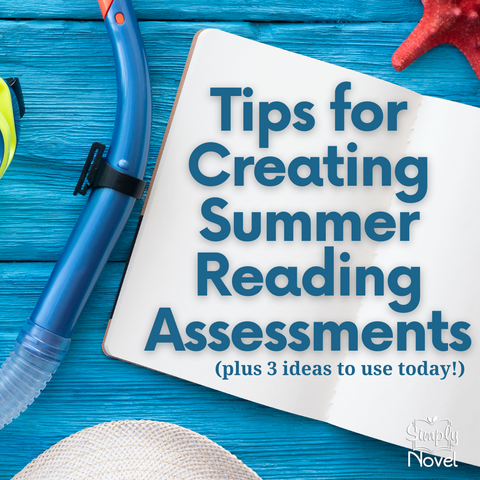Tips for Creating Summer Reading Assessment Ideas (Plus 3 Fun Ideas!)
Many teachers assign summer reading. However, summer reading can be difficult for students who lack time management skills, motivation, or even the literacy skills necessary to complete the work.
For this reason, summer reading assessment can also be challenging, as students can disengage from the material and Google answers to questions or read summaries instead of reading the book.
Despite its challenges, summer reading assignments can still have value in the English Language Arts classroom. We need to look at how we assess summer reading -- making reading enjoyable rather than a drag for everyone.

Here's how to get the most out of your summer reading assignments:
What is a summer reading assessment?
I like to look at assessments as three prongs of the same concept: Accountability Assessments, Critical Thinking Assessments, and Creative Assessments. Each one is slightly different from the other, but all equally valuable assessment tools. The three prongs overlap more often than not.
Each one has value, and they work better when you vary the types of assessments you use, and you do not rely on just one type too much. Each type of assessment requires students to think on different levels of Bloom’s Taxonomy.
What are the three types of Reading Assessments?
Accountability Assessments
These are traditional tests and assignments that aim to keep students accountable to complete the reading. Think: study guides, reading guides, and end-of-the-novel tests and quizzes. These are not to be confused with state or district-level standardized testing.
Critical Thinking Assessments
These are higher-level critical thinking assignments that encourage students to analyze, synthesize, and evaluate the summer reading. There are a variety of ways to format this type of assessment. Think: small group discussions such as a Socratic Seminar, or a literary analysis paragraph writing where students identify and analyze the purpose and effectiveness of an author’s use of figurative language and other literary elements.
Creative Assessments
These are projects and other assignments that require accountability and critical thinking, but also include creativity and fun. Think of posters, interpretive projects, video creation, podcast creation, etc.
Creative Reading Assessments
Creative Assessments are by far the most engaging and valuable to address the unique challenges of summer reading. Innovative summer reading assessments can make all the difference for kids who may not have otherwise completed the task. Having relevant, engaging, and interesting assessments will not only increase the chances that students will do the summer reading, but it will also be a great introduction to your class in the fall!
Below are some ideas for creative reading assessments for your summer reading assignments.
Snap Chat Conversation
Snapchat has been around for a while, and the way teens use it, it doesn’t seem to be going away anytime soon. Why not capitalize on that? (Kids can still keep their streaks going, too!) For this project, have students create a series of snaps that show characters interacting with each other. They can save these snaps as images, upload them to Google Slides or PowerPoint and either just turn them in, or present them. Better yet, have that student select a partner to read out loud the snaps!
Character Awards
To freshen up your summer reading assignment, try having students create unique and interesting awards for the characters. This is a good way for students to recall information and analyze character development at the same time. Ask students to come up with the award and the reason why that character earned it. For example, Boo Radley could receive the award for “Hero Least Likely to Need Sunscreen” for his valiant rescue of the Finch children after years of reclusive behavior that goes back to his childhood. To make it more fun and engaging, another student could come up to receive the award, in character, and give an acceptance speech with references from the text.
Character Letters of Recommendation
Students, especially juniors and seniors, are familiar with the art of asking and receiving a letter of recommendation. But they haven’t had the experience of writing one! With this type of assessment, students can get into the counselor/teacher character and write a letter praising, thinly sugarcoating, or even criticizing a character from the reading. Clear references to the text should be used to support your reasoning for recommending, or even not recommending, a character.
These are just three different ideas to assess your summer reading assignments for middle or high school in a creative way. What creative ways do you use to assess summer reading? We'd love to hear!
